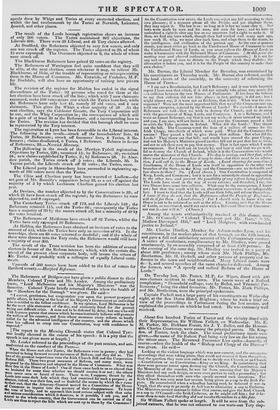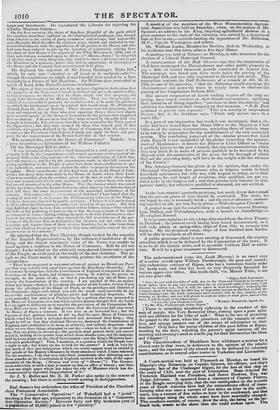About five hundred Tories of Exeter and the vicinity dined
with their Representative, Sir William Follett, on Wednesday. Mr. E. M. Parker, Mr. Bickham Escott, Sir J. Y. Buller, and the Honour- able Charles Courtenay, were among the principal guests. Mr. King- don, of Exeter, took the chair. The usual preliminary toasts were given,—the name of Sir Robert Peel being very low on the list among the minor ones. The Reverend Precentor Low spoke—learnedly, of course—when the health of the " Bishop and Clergy of the Diocese " was given, lie sa;d- Looking at the violent language which was now current, and the outrageous proceedings that were taking place, they could nut conceal it from themselves, that the question they were now called on to decide was Church or no Church —Constitution or no Constitution—King or no King. In maintaining that there were persons intent upon destroying the Church, the Constitution, and the Monarchy of the country, he was far from meaning that his Majesty's Ministers had any such design, or were even parties to such a proceeding ; but they allied themselves with men who openly avowed such intentions. The Irish Church was very near last session being given as a sop to the Irish Pa- pists. He remembered when a schoolboy having read, he believed it was in Virgil, that the way to go easily to hell was to administer a sop to Cerherus. The Ministers seemed anxious to follow that course, and give the Irish Church as a sop to O'Connell—the Irish Cerberus, as he might call him ; but it be- came them to take heed that they did not involve themselves in a like fate.
Sir William Follett spoke at length. It will be seen from the sub- joined extracts, that he was not ashamed to use worn-out Tory clap-
ceesive Parliaments with the approbation of all parties iu the House, and who had even been induced to give up the intention of voluntarily retiring from the chair of that House at the request of the Whig Ministers in 18:32, and at his residence near that town, after a few days' illness.
svhich it was intended to proceed; the resolution was to be made the platform on which the battlement was to be erected that would sweep the Protestant
were the trustees ; and but for the amendments made in that bill, instead of giving, satisfaction to the People, it must have been most mischievous to pri- of the Crown."
vote individuals, and must have shaken the titles to property throughout the The Attorney-General has given it as his opinion, that under the kingdom. Many amendments of that kind were made in the House of Coni- _Municipal Corporation Act persons who, as lodgers, reside in hired mons ; but many mole were made in the House of Lords, where their Lord- furnished apartments, but who are, with respect to rating, as to their ships were enabled, from the cridence given at the bar, to make those altera- warehouses, &c. and length of residence, duly qualified, are not en- tions and amendments Which were necessary, and to correct those evils which titled to be in the burgess-roll ; and that persons only inmates in their had passed unnoticed in the other House. -But the clamour which was raised parents' family, but otherwise qualified as aforesaid, arc not entitled. makes me believe that the framers had some other object in the introduction of that bill than the mere improvement of the municipal institutions of the country. Otherwise, what a .1.e moaning of that boast I have heard, that the At the iron-masters' quarterly meetings, last week, it was determined passing of that hill is to increase the Parliamentary influence of the Whigs? that the present prices of iron should be continued. The trade, we I believe, however, they will be greatly mistaken. I believe it tell not be anind are happy to say, is unusually brisk ; and the recent advances, amount- at all to affect the Parliamentary interest or franchise of any party. But that ing together to -..20.S. per ton, freely given.— Woleerhampton Chronicle. they had that object in view, I an induced still to believe, became they selected A project is on foot for establishing a railroad to connect firming- this bill—a bill professing to have no object but the inipioveineut of the local ham, Dudley, and Wolverhampton, with a branch to Stourbridge.— government of towns—having nothing on earth to do with Parliamentary elec- tions or the elective franchise—they selected this bill to violate one of the pro- Birmingham Journal. visions of the Refolin bill, to disfranchi-e the freemen, and not only to dis. It is in contemplation to cut a large ship-canal from the river Thames franchise and deprive them of their elective franchise. but to take from them to Dartford ; the present creek having been found inconvenient, as it and their children the propel to which they were entitled iu many of the cor- will only admit, at spring-tides, ships of from fifty to seventy tons isolate towns in this country." burden. By the proposed canal, ships of four hundred tons burden He admitted that the Peel Ministry, though backed by the majority will be able to navigate at all times. of the English Representatives, by the unbounded confidence of the A public grammar-school is now erecting at Gravesend, the expense King, and the almost unanimous voice of the Peers, was unable to attending which is to be defrayed by the Corporation of the town. It stand against a coalition in the House of Commons. Still he did not is to be of the Gothic order, and to resemble Cobham Ball in minia- despair ; for he relied on the evidently reawakened Conservative spirit ture. It will be a great ornament to Gravesend.
of the People, as evidenced in the result of the last elections. The at- tack on the Peers would, if successful, produce the overthrow of the The undermentioned (says the Leeds Mercury) is an exact copy _Monarchy— of a notice served upon William Darnborough, the poor and remark-
" There is no argument or statement advanced against an Hereditary not tell with equal force against the Hereditary Peer- Ripon, that may- Monarchy. And ably industrious cottager of ipon, who has a numerous family under it must not be forgotten, that the Constitution of England is composed of three his lowly roof, and who has been so very frequently harassed for branches—of King, Lords and Commons—owing its stability, its power, its various oppressive tithes. His tenth child, viz. Master Tithe, is not strength, to the union Of all so that if you destroy any one of them, you yet two years old. destroy the Constitution of the country. I am satisfied of this, no matter•'Ripon, 24th September. where you begin—destroy if you please the power of the Crown, destroy if you kind, am please the privileges of the House of Peers, or the privileges and liberties of nd, rather than to pay any composition for. or estimated value of the same, I a directed to inform you, that it will be taken in kind acconlim'ly ; reckoning the the Commons—begin with which you will, the result must inevitably be the evening's meal of Saturday the 26th day of September instant as the first, so that the saute—the establishment of arbitrary power and tyrannical despotism. We tenth evening's and the tenth moruing's meat (entire) will be due, namely, on the were reminded last session of Parliament, by a petition that was presented to evening of the 6th; and you will please to send me notice at what place, and at what the House of Commons, at a time when certain persons thought that the Lords hour, it will be ready to be taken away. had no right to deliberate on or consider the provisions of the Corporation Re- a To Mr. Wm. Darnborough, tailor, Ripon." " ROBZWT ROBINSON', Agent. &c. form Bill—we were told in that petition, that the Commons had once voted he House of Peers a nuisance. It was true as an historical fact - but the [There is something absolutely sickening in the conduct of this man of purple, this Very Reverend Dean, coming upon a poor tailor framers of that petition forgot to tell us, that the same House of Commons which voted the Lords a nuisance deposed and murdered their King ; they with ten children for his tithe of milk ! What is the use of preaching forgot to tell us that they abolished Monarchy, destroyed the Constitution of the gospel to the poor, when the preachers set the example of extol.- England, and established in its room an arbitrary and military despotism. And tion, and sponge paupers out of the means of subsistence to their when we see these things attempted in our day—when we look at the proceed- families? Only fancy the young children of this poor fellow at Ripon, logs that are going on around us—the questiou must present itself, you cannot standing by the door, watching the parson's agent carrying off the avoid it, looking at the quarter from which those attacks come, and the language morning and evening's meal in a milk-jug for their Reverences the Dean held byevcry paper on the side of Government—can the King's Ministers sane- and Chapter !!] tion such proceedings? That, I maintain, is a question which the People have a right to ask ; but where are we to look for the answer? I look in vain for The Churchwardens of Blackburn have withdrawn a motion for.e
a any mark of that just iodienation which one would suppose must be excited in church-rate in that town, in deference to the opinion of the inhalu the nand' of his Majesty'silIinisters by those attacks to which I have referred. tants ; and the expenses of the church are to be defrayed by voluntary Oa the contrary, I see that very individual, immediately after delivering one of contributions, as in several other towns in Yorkshire and Lancashire. those attacks on the Constitution of England, received at the table of the repre-
sentative of the King. ( Groans and cries of " Shame! ") The Govern- A Court-martial was held at Plymouth on Monday, on board his ment select him at such a time to bestow on him an office of honour • and there Majesty's ship Britannia, on Captain Symons, his officers, and ship's is not one single paper which has taken the aide of Ministers which has dis- company, late of the Challenger frigate, for the loss of that ship on countenanced or expressed disapprobation of it." Sir J. Y. Buller and Mr. E. M. Parker also spoke in the course of the coast of Chili, near the port of Conception. Rear-Admiral Sir Frederick Maitland was President, and James Hoskins, Esq. was the evening ; but there is nothing worth quoting in their;speeches. Judge-Advocate. It appeared from a statement of Captain Fitzroy,
_



























 Previous page
Previous page